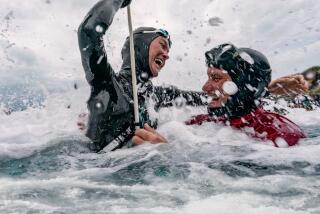Breathtaking Adventure : Blue-Water Hunters Scorn Air Tanks and Power Guns When They Stalk Big Game
John Warren has his hands full. Forty feet underwater, 105 miles off the coast of Orange County, and with only the air in his lungs to keep him alive, he has just speared a giant yellowtail. It is 6 p.m. and getting dark.
The fish, speared near the tail (a poor shot, Warren says), immediately dives straight down while Warren surfaces. As he grabs a buoy to which his line is attached, Warren is pulled down again a few feet as the fish reaches the end of its tether 130 feet below.
Warren resurfaces and puts his spear gun in the boat. Treading water in the gathering darkness, he spends the next 25 minutes in a silent battle to raise the 44-pound yellowtail.
The exhausting yet gratifying struggle, which produced Warren’s biggest catch ever, is the essence of blue-water free diving, a highly specialized form of big-game spearfishing.
These divers, scorning scuba tanks as too noisy and power spear guns as unfair, hunt beyond the safety of reefs and kelp forests. They hold their breaths for as long as 90 seconds and swim as deep as 100 feet in their search for migratory tuna, white sea bass and yellowtail in the waters off Southern California.
Warren, a 46-year-old furniture maker from San Clemente, is one of only 60 or so blue-water hunters in California. “I do it for the exhilaration,” he says. “It’s similar to bow hunting, only underwater. It’s exciting and challenging.”
Expert swimming ability is required for blue-water hunting, because the fishermen--who use thick wet suits, three-foot-long swim fins and heavy spear guns--often spend eight or more hours a day swimming in strong currents.
Of all spearfishermen, only a tiny percentage are blue-water hunters; the majority are scuba divers and snorkelers who hunt small fish in shallow water near reefs. But the number of big-game hunters is growing as other divers become aware of the sport, says Jay Riffe, a veteran diver and spear-gun maker in San Clemente.
“The term ‘blue-water hunting’ is magic right now,” says Riffe, who last year speared a record 285-pound yellow fin tuna in Mexico. The nation’s only marketer of hand-powered spear guns for big game, Riffe stocks his shop with 11 models of hand-crafted teak spear guns costing from $350 to $600.
Riffe’s largest models, for big game, weigh four pounds and shoot six-foot spears. All the guns require the diver to self-cock by pulling back on as many as six thick rubber bands. The powerful guns can shoot accurately for 20 feet through salt water, which is 1,000 times denser than air.
Riffe also sells handmade spear points, reels and shafts for divers who like to assemble their own customized equipment. Warren caught his big yellowtail using an enormous, 17-pound spear gun of his own design.
Blue-water hunters face a multitude of dangers. Sharks are attracted by bloody fish thrashing on a spear. Motorboats can run down a diver if the pilot fails to spot the red buoys that mark the hunter’s position. And divers who overestimate their air supply can black out and drown.
Of course, the fish themselves are worthy opponents, sometimes dragging the fishermen through the water at frightening speeds, filling their face masks with water.
“Yellowtail are powerful fish, and if your spear doesn’t hit that magic mark--the spine or brain--it will fight,” says Riffe, 54, who’s been diving since he was 8. “A 25-pound yellowtail can pull a gun right out of your hand, no problem. They also swim around anchor lines, dive deep or go into kelp beds.”
In Southern California, the big-game season usually begins in March, when the big white sea bass arrive, and ends in the fall. This year, the warm waters of the El Nino current have extended the season, attracting exotic fish such as dorado and wahoo, Riffe said.
Most blue-water divers eat all the fish that they kill. Warren, for example, likes to smoke the fish he spears. Some divers, such as Don-Paul Gaboury of Newport Beach, think of themselves as subsistence hunters, taking only what they can eat and eating all that they take.
“I’ve eaten fish four times a week for the last 12 years,” he says. “I can’t order restaurant fish anymore; it just doesn’t compare. Free divers can afford to be very discriminating. We pass up good-sized fish in favor of bigger ones.”
For Gaboury, blue-water free diving is almost a spiritual experience--one in which man ceases to be merely a trespasser in the ocean.
“As a free diver you get to see things a scuba diver will never see in a lifetime,” he says. “Often we don’t spear anything at all; we just observe. Holding our breath, we become very stealthy animals in the water. We become aquatic animals. We become the eyes of the ocean.”
More to Read
Sign up for The Wild
We’ll help you find the best places to hike, bike and run, as well as the perfect silent spots for meditation and yoga.
You may occasionally receive promotional content from the Los Angeles Times.






